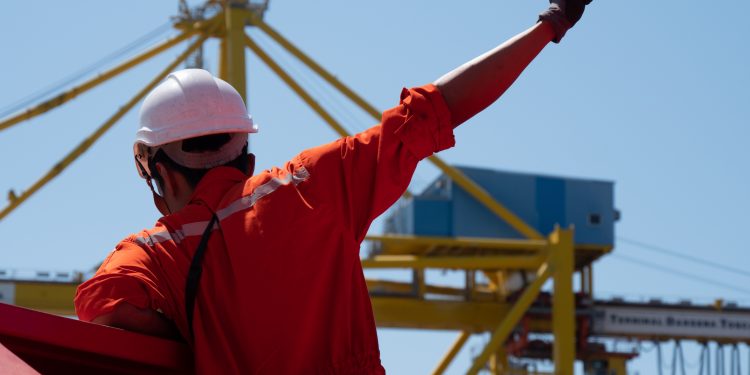In a new study commissioned by the Maritime Just Transition Task Force, DNV explores how best to support the maritime workforce in making the shift to a decarbonized shipping industry.
Three decarbonization scenarios were used in this study to provide insights into the number of seafarers who might require additional training and skills to support the decarbonization of the shipping industry:
#1 IMO 2018 scenario: The DNV model anticipates a slow uptake of alternative fuel technologies in the current ‘IMO 2018 scenario’. In this scenario it is considered more cost-effective for the industry to use drop-in fuels rather than retrofitting or building new vessels that use alternative fuel technologies.
Moreover, in line with an assumed low uptake of alternative fuel technologies in the near-term, the number of seafarers working on ships using these types of fuel technologies only increases slightly until the late 2030s. After this point, the number increases dramatically year by year. In 2050, it is estimated that 310,000 seafarers would be working aboard vessels using alternative fuel technologies.
#2 Decarbonization by 2050 scenario: Similar to the aforementioned ‘IMO 2018 scenario’, the model assumes a slow uptake of alternative fuel technologies in the 2030s, but with a steeper uptake from 2040. It is still assumed that the industry will find it more cost effective to use drop-in fuels, rather than retrofitting or building new vessels that use alternative fuel technologies.
In addition, the same trends as observed for the ‘IMO 2018 scenario’ are assumed, with a slower transition of seafarers working aboard ships operating on conventional fuels to ships using alternative fuel technologies in the 2030s. In 2050, it is estimated that about 750,000 seafarers will be working aboard vessels using alternative fuel technologies.
#3 ‘Zero Carbon by 2050 Scenario: This scenario assumes a much earlier uptake of alternative fuel technologies compared to the previous scenarios, from the 2030s onwards.
In this scenario, modelled by Lloyds Register and University Maritime Advisory Services (UMAS), 450,000 seafarers would require some additional training by 2030, while 800,000 seafarers would require some additional training by the mid-2030s. This scenario assumes a sharp ramp-up of alternative fuels in the 2020s.
Conclusions
It is expected that seafarers will require some kind of relevant training as and when alternative fuel technologies are implemented by Ship Operators.
The number of seafarers working on vessels equipped with alternative fuel technologies increases substantially in the more rapid decarbonization trajectories.
In the DNV modelled ‘IMO 2018’ and ‘Decarbonization by 2050’ scenarios, Ship Operators, seafarers and training/ education centres would see a significant rise in the number of seafarers needing to receive some kind of training due to alternative fuel technologies in the 2040s.
In the LR and UMAS ‘Zero Carbon by 2050’ scenario, the number of seafarers requiring some kind of training rises steeply in every year to 2050. In this scenario, additional training requirements could put a much higher strain on Ship Operators, seafarers and training/education centres if not properly planned for. However, the alternative fuel technologies might not be available as early as this curve suggests, due to technology maturity issues.
In the DNV modelled ‘IMO 2018 scenario’, the number of seafarers working on ships equipped with alternative fuel technologies peaks at 310,000 seafarers, whereas in the DNV modelled ‘Decarbonization by 2050’ scenario and the LR and UMAS modelled ‘Zero Carbon by 2050’ scenario, the numbers are 750,000 and 1,775,000, respectively.
The number of seafarers expected to work on ships fuelled by LNG/LPG would increase by approximately 100,000 new seafarers every two years until 2038 in the DNV modelled ‘IMO 2018’ and ‘Decarbonization by 2050’ scenarios. Seafarers working on vessels fuelled by LNG/LPG will require training according to STCW requirements.
It is also worth pointing out that in the DNV modelled ‘Decarbonization by 2050’ scenario, the analysis shows that the number of seafarers on LNG/LPG-fuelled ships drops back around 2040. This may imply that seafarers who have been trained to be competent to work on LNG/LPG-fuelled ships, will need to be retrained for other alternative fuel technologies.
In the LR and UMAS modelled ‘Zero Carbon by 2050’ scenario, the necessary training for seafarers would consist of training in the use of alternative fuel technologies, instead of LNG/LPG training.
Regardless of the scenario, the analysis shows that there will be a need to provide additional training to a vast number of seafarers over the coming years, in order to support shipping’s transition. This will be both as STCW training for LNG/LPG and, more importantly, for alternative fuel technologies.




























































